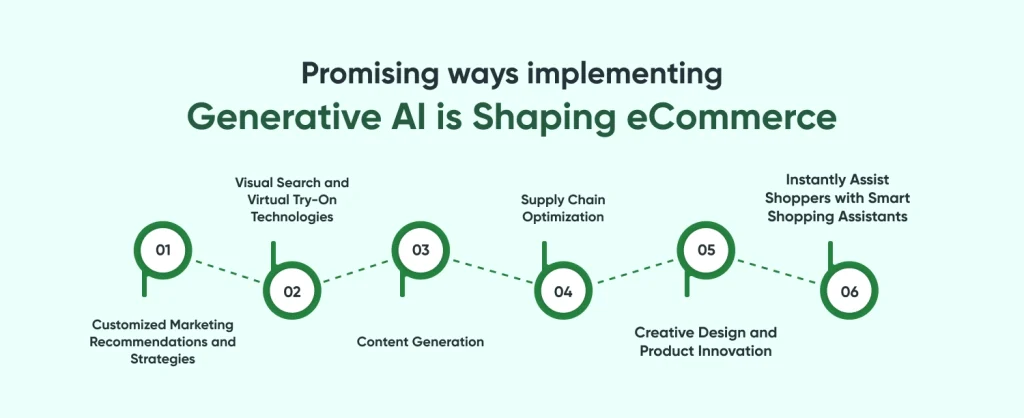E-commerce has always been at the forefront of the adoption of new web technologies, whether it was the IoT in eCommerce or, today, Generative AI in eCommerce. E-commerce owes much to it, and many innovative solutions are available to cater to virtually all aspects of the online marketplace. With Generative Al e-commerce, it is possible to produce product descriptions, reviews, blog posts, and machine learning algorithms that can create a whole website.
Using Generative Al tools, companies can analyze customer data and behavior to provide customers with a more customized shopping experience. Individuals can be advised of products and services that meet their preferences, or they can even interact with the company.
Reports forecast that generative AI will generate 30% of outgoing marketing messages in 2030. Moreover, generative Al will increase the appeal of the global Al market, worth $207 billion. Here we have put together the top ways Generative AI for e-commerce is boosting the eCommerce world, changing the future of shopping with eCommerce Software Development.
What Is Generative AI?
A generative AI algorithm is generally trained on datasets that contain already existing instances of a certain type, such as facial photography collections, literature about languages, or musical compositions. Even if you Build an eCommerce Business, make sure to give attention to generative AI solutions to boost sales and shape user experience.
With these algorithms, new content can be generated that, when trained, displays remarkable levels of uniqueness and accuracy while remaining closely related to the training samples.
Statistics of AI in e-commerce
Let’s start by looking at three incredible statistics about Generative AI for shopping:
- Approximately $54 billion is expected to be generated by eCommerce AI by 2032
- 84% of businesses in the e-commerce sector prioritize AI
- With AI for e-commerce, you can improve customer satisfaction, revenue, and costs by more than 25%.
As these statistics demonstrate, the AI eCommerce business model is becoming increasingly important to the e-commerce industry and can benefit businesses and consumers. Businesses continue to implement AI-defined eCommerce Software Development to boost customer interactions, offer custom product recommendations, and organize internal operations to streamline the shopping experience.
Promising ways implementing Generative AI is Shaping eCommerce
With Generative AI entering the game of E-commerce, businesses will enjoy the next generation of e-commerce. This allows businesses to take all advanced approaches for conducting business and boosting user experience. Here are the top ways implementing Generative AI makes sense for e-commerce business owners to make operations more efficient, improve customer satisfaction, and transform marketing:

Customized Marketing Recommendations and Strategies
The ideal way where Generative AI comes to shape e-commerce is by customizing marketing recommendations and strategies. This AI solution integrates a range of data and resources from purchasing records, browsing behavior, and so on to offer custom recommendations to give the upper hand to customer experience.
Let’s understand with the help of an example, Netflix implements generative AI to deliver impressive recommendations. With AI systems, streamlined platforms gain an edge over user experience by giving them the best suggestions based on viewing history to enhance their AI-powered shopping experiences.
With AI technology, Spotify gets a free hand to give a custom touch to user interfaces depending on each individual’s preferences. This leads to offering exceptional user experience.
On top of that, AI is added to the play to give a custom touch to marketing messages, which leads to turning up sales for online stores.
Visual Search and Virtual Try-On Technologies
Using visual search, customers can quickly find the products they’re looking for because algorithms use artificial intelligence to match uploaded images with similar items in the company’s inventory.
Pinterest, for example, uses generative AI to find items based on the photos users upload by comparing images.
Virtual try-on technology, on the other hand, uses generative artificial intelligence in order to digitally overlay clothing, accessories, and makeup on images and videos. Seeing how these items will appear on them beforehand helps them make a purchasing decision.
As a result, users become more confident, and returns decrease, thereby increasing sales and customer satisfaction.
Content Generation
Generative AI works wonders for the eCommerce world by automating the task of generating content, including product descriptions, reviews, blogs, and social media posts.
These algorithms create accurate, informative texts by analyzing information and patterns within them, enabling them to produce texts faster than humans and remain engaging even over long periods of time.
For example, Alibaba makes use of algorithms such as this to generate descriptions for its millions of products. The seller’s listing process will be simplified, and each product will be described in detail to appeal to prospective buyers.
Supply Chain Optimization
Generative AI boosts the game of supply chain which makes it easy for businesses to go over the process of supply chain conveniently. It includes order processing, inventory management, and demand forecasting. With artificial intelligence algorithms, outside variables such as weather and economic indicators are analyzed in addition to statistics in order to make accurate predictions.
These projections can help companies anticipate modifications to demand and adjust stock accordingly.
For example, Walmart uses artificial intelligence algorithms to predict demand throughout multiple locations, enhancing green stock control and reducing inventory and overstock issues.
Creative Design and Product Innovation
By using generative AI tools, designers and developers can discover thoughts faster and more effectively, which is reworking the creative process and driving innovation. By using these algorithms, new designs, fashions, and designs can be generated, and products can be improved much faster.
With generative AI algorithms, companies like Autodesk are able to modify hundreds of layouts in accordance with various standards and constraints. Once these adjustments have been made, the designers can evaluate them and think about opportunities that meet the favored values.
Prototyping can also be simplified through generative AI by automating the creation of 3D models and virtual prototypes based on layout specifications. By using this method, artists will be able to quickly provide you with and reproduce their designs, which reduces the amount of time and money it takes to prototype.
Instantly Assist Shoppers with Smart Shopping Assistants
The unmanifest hero of the retail world is customer service. Maintaining customer happiness is vital, but it takes up a lot of time and resources. The AI-powered chatbot has arrived.
A chatbot is the digital equivalent of in-store support staff, providing guidance, answering customer questions, and helping them find what they are looking for while reducing the turnover of the call centre staff.
In addition to not taking coffee breaks or calling in sick, Shopping with AI chatbots is available around the clock, so customers receive support whenever they need it, day or night.
Chatbots can relieve your customer support team of the burden since 90% of customer inquiries can be resolved in 10 messages or less.
It is also reported that 62% of consumers prefer to talk to a chatbot than a human agent if they have to wait 15 minutes for an answer.
Additionally, chatbots can provide more than just customer support. With AI and digital shopping assistants, customers can be upsold and cross-sold to higher-order values by suggesting related products.

Why Implementing Generative AI in eCommerce is Beneficial?
Increasing Sales
The use of artificial intelligence streamlines the shopping process by making personalized suggestions and streamlining the search process. As a result, the customer is more likely to buy things since the selection is tailored to their interests. Having a pleasant shopping experience improves customer satisfaction and increases sales.
Enhancing the Efficiency of Shopping
Using Generative AI, you can answer customer questions or update product listings easily. It allows teams to focus on creative work and big-picture thinking. The goal isn’t just to finish tasks faster. It’s about allowing people to make the most of their skills.
Analyzing Data Better
Artificial intelligence digs deeper than just handling transactions. With this technology, companies can observe customer behaviour, market trends, and the smooth running of operations. These data help companies make smarter choices, increasing their growth and providing better customer service. It transforms simple data into valuable information.
Reduced Cart Abandonment
Businesses can use artificial intelligence to analyze the reasons for cart abandonment, gaining insight into these problems. Whether the checkout process is optimized or customers are reminded promptly, artificial intelligence increases the chances of success by reducing cart abandonment rates.
Reduced Costs
The use of artificial intelligence in e-commerce also saves money. In addition, it manages product listings and customer service on its own. Consequently, companies require fewer customer service personnel. There will also be fewer errors in product listings, so fixing them will be more affordable. Moreover, this efficient approach optimizes the use of businesses’ resources. It allows them to expand and enhance their services.
What are the Challenges of Generative AI in eCommerce?
Relevance and accuracy
A successful AI system must offer accurate, helpful suggestions. Therefore, it must constantly learn and improve. A lot of data is used by artificial intelligence systems to guess what you might like or need. It’s possible, however, that their suggestions will become obsolete if they don’t keep learning and adapting. As a result, things may become more challenging instead of easier.
Complexity of integration
It is quite challenging to integrate AI into current digital setups. In order to succeed, it requires careful planning and a solid understanding of business and technology. Furthermore, it is more complex to ensure that AI systems integrate effectively with existing processes and systems. For many companies, this step involves a great deal of expertise and time, which presents a big challenge.
Future of Generative AI in eCommerce
Generative AI in eCommerce is beginning a new era of e-commerce and shaping a bright future. Artificial intelligence is growing rapidly and improving online shopping. The online store industry is getting smarter, so it knows what each customer wants better and better. By leveraging Future trends in eCommerce AI, they make shopping feel personalized and spot-on for every customer.
By implementing Generative AI solutions, online shopping is getting more interactive, convenient and custom to every customer’s needs. To attract customers to your products and advancement, it’s time to choose AI software development services to bring AI solutions into the picture.
Conclusion
Generative AI is set to transform the eCommerce industry which is making it easy for customers to shop for products and giving opportunities for businesses to multiply sales. With the wave of generative AI flowing all around, it has become more and more important for businesses to take on AI algorithms to stay ahead of the competition.
If you are looking ahead to implementing AI advancement to your online store, it’s the perfect time now to reach out to an AI software development services provider with the requirement to create a shopping app that embraces AI algorithms. This helps in boosting customer experience and boosting sales. Get started today with the best Generative AI solutions.
Frequently Asked Questions
How is Generative AI changing the shopping experience for customers?
Generative AI allows retailers to compile and evaluate product reviews, thereby providing insights into customer sentiment. As a result, proactive marketing strategies can be adjusted, improving the customer experience even further.
How does Generative AI improve inventory management in eCommerce?
Implementing AI is essential for eCommerce businesses to ease the task of improving inventory management. With the help of AI, companies can read the demand patterns and optimize stock levels to avoid stockouts and overstocks.
Can Generative AI help with visual product customization?
Yes, Generative Al keeps improving its ability to create personalized visual content. An Al algorithm, for example, generates product images and videos based on customer preferences. Fashion retailers often use this technology to help customers decide what to buy based on visual inspiration.
Can small eCommerce businesses benefit from Generative AI?
Yes, even small e-commerce businesses make most of their sales from implementing generative AI. Whether it is giving recommendations to managing inventory, businesses bring the best for customers. From small to large stores, every e-commerce business witnesses wonders with ideal ways to implement generative AI.







